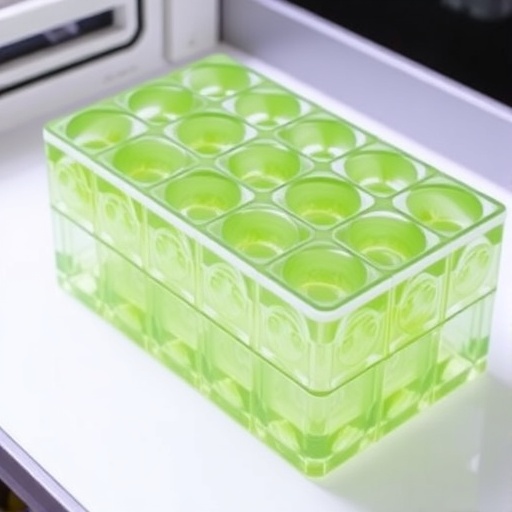
In the realm of sustainable agriculture and environmental remediation, the spotlight has increasingly turned to microalgae as a powerhouse for carbon sequestration and as a bioresource for various applications. A recent scholarly investigation led by researchers Yang, Li, and Zhang, published in the journal International Microbiology, highlights the remarkable potential of Chlorella vulgaris, a prevalent species of green microalgae known for its rapid growth rates and rich nutritional profile. This study systematically evaluates different cultivation conditions facilitated by hydrogel systems aimed at optimizing the growth of this promising organism, which could revolutionize applications in biofuels, nutrition, and water treatment.
The research emphasizes the versatility of hydrogel systems, which offer a unique environment that mimics natural conditions while providing an ideal medium for algal growth. These hydrogels can retain moisture and nutrients, creating a microenvironment conducive to enhancing the growth potential of microalgae. By carefully analyzing the interactions between Chlorella vulgaris and various hydrogel formulations, the study presents a compelling case for refining cultivation strategies that could significantly increase algal biomass production.
One of the study’s primary objectives was to assess how different environmental parameters influence the photosynthetic efficiency of Chlorella vulgaris. The researchers meticulously adjusted variables such as light intensity, temperature, and nutrient concentration, uncovering crucial insights into the optimal conditions for algal proliferation. By employing advanced spectroscopic techniques, they measured the photosynthetic pigments’ concentration to ascertain the impact of these parameters on algal growth rates.
.adsslot_scaf3PUKG7{width:728px !important;height:90px !important;}
@media(max-width:1199px){ .adsslot_scaf3PUKG7{width:468px !important;height:60px !important;}
}
@media(max-width:767px){ .adsslot_scaf3PUKG7{width:320px !important;height:50px !important;}
}
ADVERTISEMENT
Furthermore, Yang and colleagues explored the potential of integrating waste materials into the hydrogel systems. By utilizing agricultural and industrial by-products as nutrient sources, they demonstrated that not only can these hydrogels support the growth of microalgae, but they can also contribute to waste valorization. This dual approach of enhancing algal productivity while providing a sustainable solution for waste disposal presents a groundbreaking direction in algal cultivation.
The study’s findings also highlight the implications of hydrogel matrices on cell growth and lipid accumulation. Increasing lipid content in microalgae is vital for biofuel applications since lipids can be converted into biodiesel. Through precise manipulation of hydrogel cultivation conditions, the researchers successfully increased the lipid profiles of Chlorella vulgaris, indicating that hydrogel systems could be integral to future biofuel production frameworks.
Moreover, the adoption of hydrogel systems in cultivating microalgae enables the exploration of large-scale applications. The scalability of these systems remains a pivotal factor in the transition from laboratory findings to real-world implementation. The researchers discussed strategies to enhance scalability, including the development of modular hydrogel systems that can be easily expanded in both land-based and aquatic environments.
In a broader context, the research contributes to the ongoing discourse around sustainable practices in agriculture and energy production. As the global population continues to rise, the demand for food, energy, and clean water grows exponentially. Algae, particularly Chlorella vulgaris, often touted as a superfood, presents valuable opportunities not only in the food industry but also in combating climate change through carbon capture. The potential these organisms hold for addressing multiple issues simultaneously makes them a focal point in sustainable development discussions.
The study outlines the necessity for further research into ecosystem interactions involving microalgae. By understanding how hydrogel systems interact with local flora, fauna, and microorganisms, scientists can devise comprehensive ecological models that encompass the broader implications of algal cultivation. This step towards ecological synergy will be essential in developing a holistic understanding of microalgae’s role in ecosystems and their potential contributions to biodiversity.
In conclusion, the investigation into hydrogel systems and their effect on Chlorella vulgaris growth represents a significant advancement in microbiological research with actionable applications. By optimizing cultivation conditions and integrating sustainable practices, researchers like Yang, Li, and Zhang are paving the way for innovative solutions in agriculture, energy, and environmental sustainability. The potential for high biomass yields, combined with waste valorization and energy production opportunities, underscores the urgency for continued exploration in this field.
This research not only opens avenues for practical applications but also reinforces the importance of interdisciplinary approaches. The collaboration between microbiologists, ecologists, and engineers will be crucial in overcoming the challenges associated with scaling up microalgae cultivation. The integration of hydrogel systems into algal production systems serves as a paradigm for future green innovations, positioning Chlorella vulgaris at the forefront of sustainable development.
By fostering an environment where science and technology can converge, projects like this are instrumental in addressing the pressing issues humanity faces, such as food security, climate change, and clean energy requirements. As further studies build upon these findings, the global community may very well witness a paradigm shift in how we approach resource management, sustainability, and environmental responsibility.
In summary, the exploration of Chlorella vulgaris cultivation under hydrogel conditions offers a promising glimpse into the future of biotechnology and resource sustainability. With an understanding of how to optimize growth through innovative approaches, researchers can harness the full potential of this microalga to create solutions that align with both ecological integrity and economic viability.
The impact of this research extends to educational perspectives as well, encouraging upcoming scientists and innovators to consider how interdisciplinary practices can yield groundbreaking results. The story of Chlorella vulgaris in hydrogel systems is just beginning, and as curiosity drives exploration, the horizons of what is possible continue to expand.
Subject of Research: Cultivation conditions of Chlorella vulgaris in hydrogel systems.
Article Title: Evaluation of cultivation conditions in hydrogel systems to enhance Chlorella vulgaris growth.
Article References: Yang, G., Li, M., Zhang, J. et al. Evaluation of cultivation conditions in hydrogel systems to enhance Chlorella vulgaris growth. Int Microbiol (2025). https://doi.org/10.1007/s10123-025-00670-7
Image Credits: AI Generated
DOI: https://doi.org/10.1007/s10123-025-00670-7
Keywords: Chlorella vulgaris, hydrogel systems, biomass production, sustainable agriculture, algal cultivation, environmental remediation, biofuel production.
Tags: biofuels from Chlorella vulgariscarbon sequestration using microalgaeChlorella vulgaris cultivationenhancing growth potential of Chlorella vulgarisenvironmental remediation strategieshydrogel formulations for algal biomasshydrogel systems for microalgae growthmicroalgae in water treatment applicationsnutritional benefits of microalgaeoptimizing algal growth conditionsphotosynthetic efficiency of Chlorella vulgarissustainable agriculture with microalgae





